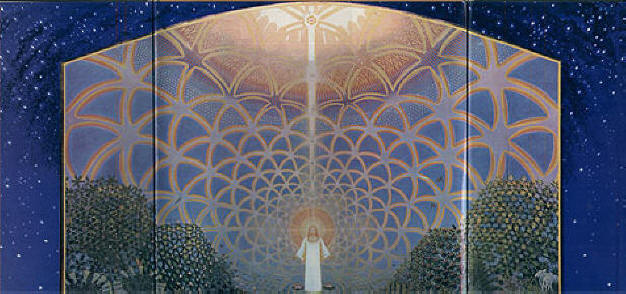
[Ed. note: This interview was first published on the Shiva's Quintessence web site and is reprinted here by permission of Professor Cornelius. See the Aural Innovations review of the new Shiva's Quintessence album, Cosmic Surfer, also in this issue.]
From Aural Innovations #32 (November 2005)

Now, over thirty years later, this spirit has been rekindled. CD reissues have reintroduced the music to a wider audience. Key members have branched out in different musical directions. But the projects closest to the original Quintessence flame have come from the prolific creativity of Shiva Jones. Shiva’s link-up with Swiss keyboard maestro Rudra Beauvert has born fruit with two greatr albums already this decade. The two front Shiva’s Quintessence, a band with enough maturity to welcome plenty of guest artists – such as Maha Dev - and to simply show a great sense of fun that was largely absent from the original band. Sparkling remakes of Quintessence originals rub shoulders with biting satires on the mess of our modern world. The jams may be out, but the otherworldly mystical dimension has not been lost.
Professor Cornelius, English journalist, lifelong Quintessence fan and enthusiast for all things spiritual and Eastern, got in touch with both Shiva and Rudra and cajoled them into answering questions about the past, present and future for Quintessence music. Edited highlights follow:

EARLY YEARS
Were any of your family musical?
No, just me.
How did you learn to sing like you do? Was it in a choir at school?
Singing comes as second nature to me and has always felt very comfortable and familiar. I think, ultimately, it is the accumulation of many lifetimes of singing that has made the voice what it is.
As a young child I can remember making up little songs and singing them in the bath tub - usually with a African-American southern spiritual vibe. My mum would say "Where did you hear that?" and I would say "I don't know, I made it up."
I was in the school choir and also a soloist. I represented my school in competitions. I had a great singing teacher, called Brother Smith. He was full of passion about music and was a great piano player. He often slammed the lid of his piano and stormed out of the music hall in great disgust at our inability to focus or get the piece right. I was most impressed and somewhat terrified.
What was growing up in Australia like? Was it really a cultural wasteland?
Growing up in Australia in the fifties was a bit like the US TV sitcom “Leave it to Beaver”, - which is still one of my favorite TV shows - and I'm not kidding.
I enjoyed all the pop music of the time, which has undoubtedly influenced my style today. I liked people such as Del Shannon, Dion, the Everly Brothers, Rick Nelson, Gene Pitney, the Isleys and the Phil Specter stable and many more.
Then the UK beat group invasion hit Australia. Of course the Beatles, Stones, the Who and the Kinks had an impact. From there I discovered Blues and R&B, and my group The Unknown Blues was born with like minded school buddies. We were only 16 but we devoted ourselves to a serious and original expression. The Unknown Blues is now considered one of the forefathers of Australian Blues, which is now huge in Australia. When we were playing the Blues and R&B back then, no one knew what it was. So we raised quite a few eyebrows.
In the few live pictures of Quintessence that I've seen, you seem to sing with your hand often over your diaphragm. Was that deliberate?
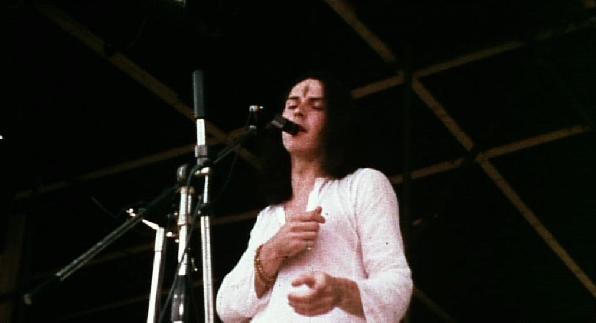
The hand over the diaphragm was not intentional. Photographers just caught me in that moment. I used to move and wave my hands around a lot.
What was it like playing live in your first band?
The first time I sang with the Unknown Blues, I was 15 going on 16 and I felt very shaky and insecure. So I decided that I had better wear some cool shades. They went well with the Blues image and covered any weirdness I was feeling.
By the time the Unknown Blues had built up a strong fan base, through lots of gigging, residencies in hip R&b clubs, major outdoor festivals and a hit record with "If I had A ticket", I was a well-seasoned performer. So, by the time I got to the UK and teamed up with the boys in Quintessence, I was ready to take on the world.
ON THE ROAD AGAIN
Where did the India interest come from?
I was seriously looking for "an enlightened Master" and was curious about mysticism from about the age of sixteen. Of course, back in the 1960's, Hindu gurus were everywhere, but none of them did it for me. They didn't have what I was looking for.
So I felt a calling to leave my successful music career behind in Oz and go on a pilgrimage. I did not head to India, but to England, the home of my ancestors, to find my enlightened teacher and discover my higher purpose in life.
I went to India only once, very briefly, in the 1970's. I've never felt a need to go there as I had such an intense and concentrated spiritual connection with Swami-Ji, although I have had some vivid recollections of past lives in India.
SWAMI-JI
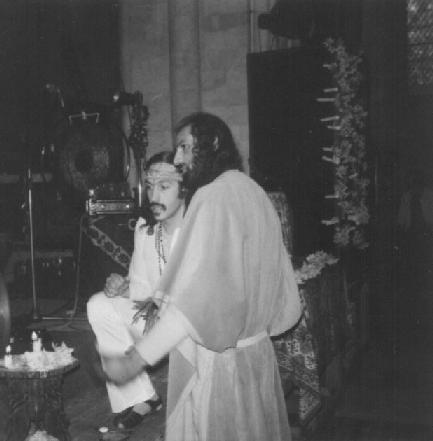
Can you tell us about Swami Ambikananda?
He was always the same - a constant shining spiritual sun. It was the rest of us who would come closer or drift away from him, according to how much spiritual heat we could handle.
I found that SwamiJi - as a master of spiritual psychology - had a way of creating a mirror effect, so that you could not help but see yourself, warts and all. Being with Swami Ji, I had many overwhelmingly beautiful and blissful times and, conversely, many times where I saw myself for who I really was. Some of it pleased me and some of it did not.
Most of us run away from inner change, and the thought of truly looking at ourselves and dealing with self imposed karma is too painful, so we continue to ride the merry-go-round of repeated negative behavioral patterns until the pain is so great that we look for an escape or we self-destruct.
The break up of Quintessence created a difficult situation for me with regard to being present at meetings with Swami-ji, as I felt, at the time, that I could not be in the same room with those who had taken my career and livelihood away from me.
As my life has progressed, I have come to realize that I am responsible for everything that has happened to me and that I have created my own reality in order to learn valuable lessons - some joyful and some painful. I have also found that by understanding and embracing these basic principles, I am no longer a victim of circumstance and that “blame " kept me on that karmic merry-go-round of payback.
I still feel very close to SwamiJi. His presence is part of the inspiration I feel during my talks and workshops.
RIDING THE QUINTESSENCE ROLLER COASTER
Did you ever have time in the Q experience to pause and reflect on it all, or was it all just one big roller coaster ride of gigs, recording studios and travel?
Probably the best times were spent in reflection with Swami Ji. When I was in his presence it was obvious that the Q experience was all worthwhile. His influence took me beyond the duality of adulation and criticism. It all seemed to fade away in the great joy and awareness that I was in the presence of an enlightened Master, who had gone beyond the mortal frame and had embraced his immortal connection to Spirit, which he called Divine Mother. What this has done for me now is that it has self-empowered me to be all I that can be in this life.
THE LIVE EXPERIENCE
What do you remember about singing in front of crowds with Quintessence?
Looking out at a sea of eighty thousand people at a rock festival, or six thousand people at the Albert Hall - and sharing your personal creative expression - is a seriously exhilarating, uplifting and thrilling experience. Singing still is a very fulfilling experience for me.
How did a typical gig develop in terms of a set list or tried and tested numbers you always played?
We had a framework for a song and that was about it. We purposefully arranged it this way to leave plenty of room for improvisation and spontaneous interaction with the audience.
We had songs that people would request like Ganga Mai, Jesus-Buddha, Notting Hill Gate, Cosmic Surfer etc. and we would treat them the same way.
We spent so much time together that it was like being married only we didn't have the "you know what" to keep it going. Yes there was the music, and on a much deeper level there was also Swami Ji. But underneath it all, we were just a bunch of guys doing our best to create something unique and different.
Can you remember any particular highlights in gigs?
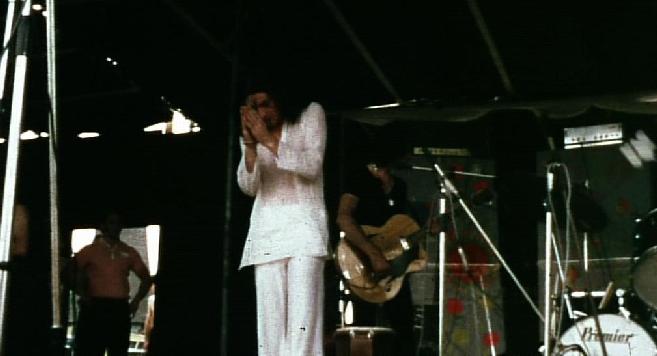
The Royal Albert Hall was a great gig. It was a sellout and the audience was superb!
THE Q-UNIVERSE
What was the relationship of two important people in the Q-universe, John Barham and Stanley Barr, to the band?
John Barham was our producer on a couple of albums. He was an excellent classically trained pianist and flugal horn player. He worked with Ravi Shankar and George Harrison on "Wonder Wall" and "All things Must Pass" as well, as many other projects. He was a really nice guy and great to work with.
Stanley Barr was our manager and a poet as well. He wrote some of the lyrics for early Q songs. He passed away a few years back and I was fortunate to see him just before he “transitioned”. I dedicated a song to him on my Sunrise cd.
Looking at your press clippings I can see there was a bit of low key PR going on.. did you guys really hand out incense sticks, for example?
Of course we gave out incense. In fact we were banned from the Albert Hall for giving out joss sticks. It made all the music papers of the time.
How aware were you as a band of how different you really were from the other bands of the time? Were there any bands you felt some kind of spiritual connection.. I guess Hare Krishnas included because you shared similar views..
The Hare Krishnas of the time had a some what fundamentalist approach to spirituality, and often openly criticized us at gigs, telling people that we were leading them away from Krishna Consciousness and that they should stay away from our shows..
The Jesus freaks did the same thing, and we also pissed off various other religious organisations. This tends to happen when you try to let people know that all spiritual paths and religions lead to the same God. They get insecure and angry.
THE BEATLES
George Harrison seems to have been one of the few musicians with the same mind-set. Did you ever meet him?
I came close to meeting George and John but it was not to be this time around. And yes I really loved George Harrisons music, as did everyone else. And there’s a story about John...
Which is?
During a recording session at Trident Studio, which I think was in the Soho or downtown area of London, I had gone off on my own for a bite to eat. I saw this little Chinese "hole in the wall" restaurant, went in and ordered a bowl of rice and veggies.
There was only one other person in the restaurant. He had long hair and a beard and was sitting in the other corner by himself. He kept looking over at me. Eventually he got up and came over to my table.
He said "Are you Shiva, the lead singer in Quintessence?"
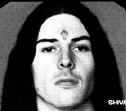 Thinking he was a fan and needed an autograph, I politely answered "Yes I am".
Thinking he was a fan and needed an autograph, I politely answered "Yes I am".
He then introduced himself by saying that he was Peter Brown and that he was John Lennons' personal manager.
He told me how John couldn't leave New York at the time because of immigration hassles and that he had to come back to England a couple of times a year to take care of Johns' business affairs.
He then invited me to stay at Johns' mansion in Tittenhurst, near Virginia Waters.
The place was great as all John’s energy was still in the house and on the property. I enjoyed playing the white piano which shows up on the Imagine album and movie and I also thumped away on a little upright piano. This had a brass plaque on the side which said “on this piano John wrote: Lucy in the sky with diamonds, For the benefit of Mr. Kite and many others”. I noticed a few years back that it was auctioned off for many thousands of dollars.
How much keyboards did you play for the band?
I played minimal keyboards on stage at the time and focused mostly on my first job, which has always been the lead singer and front man of a band.
And your drumming?
My drumming was self taught. Having worked with rhythm sections for several years I had picked up the basics, although a singer must have a good sense of timing and be able to phrase accordingly. So at one end of the band is the drummer and the other end is the singer and all else is in between. The lead singer must intuitively understand all the instruments and work with them in fusion and harmony.
Was having chants on your albums and in live concerts deliberate?
Placing chants in our songs was definitely a planned concept, although often they evolved out of improvised audience interaction at gigs. Ganga Mai, Krishna chants, Shiva chants and chants that were made up in those magic Quintessence live moments were mostly what we did.
I remember a gig at the Queen Elizabeth Hall in London, and in the front row sat the Ambassador from India and some lady guru who was the head of a big Shakti sect in India. At the end of the show they came back stage and said "where did you learn to sing and chant Ganga Mai like this?" I told them that Swami-ji had taught us, and they immediately wanted to meet him, which they did. And for several days Swami-ji proceeded to blow their minds with his spiritual realisation.
Why does your third Island album “Dive Deep” have such a crisp sound? This was recorded in a different studio, right?
Yes, at a good studio (at Basing Street, London). Island records had turned an old church into a double studio, one upstairs and one downstairs. It was a pretty cool place to record.
I think that was when we said Hi to the guys in Led Zeppelin while they were recording in the studio upstairs. Perhaps we had better engineers or maybe Island had upgraded their equipment - or maybe our ears just got better!

What about the Quintessence choir that often backed the band?
The choir was the ashram devotees.. Most of us considered ourselves 'householder monks' as Swami ji so aptly put it. For some time he lived upstairs from me, and that was a treat. The inner circle had around 20 to 30 people, but this varied. The choir was made up of significant others, none of whom were professional singers but did lots of chanting with Swami-ji. It lent that grass roots feel that so appropriately fit Quintessence. I think I have captured a similar feel on Shiva’s Quintessence with the different friends and spiritual groups I have met in the USA.
Why did the original band break-up?
The bottom line was that the band members wanted to go in different directions or perhaps we didn't really know what direction to go. It was just that we didn't want to go there together… where ever that was. But I think most people were saddened and disappointed at the break up.
Why did you resist being turned into glam rock superstar around the time of Kala, the band you fronted after Quintessence?
The thought of putting on a glitter suit and copying the trends of the time was nauseating to me. I just couldn't go from the creative expression of Quintessence to that, and as I have said, the money and fame were not my motivation.
How much did Australia know about Shiva Jones?
Quintessence had a solid following in Australia. But I am not sure how many folks connected Shiva Jones to Phil Jones of the Unknown Blues.
You were all very young. And it was the 60s/70s. But were you surprised at how that entire culture came so quickly undone?
As the light moved through society at that time, the darkness was getting ready to make its presence felt. I see a similar thing happening today on the Geo-Political front. I think it's been happening this way since the beginning of time.
FAME AND FORTUNE
You've had this strange relationship to fame in your life. How has that been for you? How did you find your centre after all the craziness and disappointment of broken record deals?
As the great sage and one of my heroes John Lennon said, "I just had to let it go." Once I let it go, it become an attitude of acceptance that if I am supposed to do this work it will make itself apparent; and, if my eyes are open, then a new path of expression will open itself to me.
It was never about the money or fame for me. If it had been, I would have formed a basic rock and roll group looking for name, fame and money. My musical expression has always been about sharing something meaningful that, perhaps, will cause a person to reflect on the impermanence of human life and connect them to the core of their conscious being.
AFTER QUINTESSENCE, THE HEALING WORK
Over the years, did you stop singing?
I have had different bands over the years with some great players. I almost got a deal with Elektra records in the late 1980s. The band was called Phil Jones and Room 101. There were periods when I wasn't singing professionally and was working different jobs in the straight world, but I've always kept the flame alive.

Can you tell us a little bit of how you came to the didgeridoo?
My wife Jennifer and I went back to Australia for what we thought would be a six week trip and ended up staying close to six years. It was during that time that I connected with the didgeridoo.
We participated in various native conferences and felt a strong bond to the Aboriginal people and the indigenous people of America and other countries. My interest in the didge was rekindled.
Having grown up in Australia and having Aboriginal friends at school, I knew what the instrument was but back then, but couldn't see how it would fit into my Blues band. It is funny how I had to make a full circle from England to the US and then back to Australia to find it in my own back yard. I can honestly say that this instrument has transformed my life in many wonderful ways.

How has this work developed?
For the past ten years or so my wife and I have been travelling extensively doing the Didgeridoo workshops, talks at Churches, Universities ,Yoga centers, hospitals and various alternative healing centers. We feel that this is our Dharma and the sense of fulfillment is extremely uplifting. This is the next logical step for me from Quintessence in terms of personal creative expression and fulfillment.

Your modern work is strewn with tantalizing glimpses of several kinds of new age topics... UFO's, the ultimate home/source of humankind, etc. But in your own life how has that all come together? Are you basically Phil Jones regular guy, or Shiva the very intense devotee, or something different again?
My wife says that I am both and then some! It's hard to talk about one's self in that way. Suffice to say that life is a balancing act. Yes, I have all those influences but, no matter how life has evolved on this planet, it has all emanated from the Infinite Ocean of Conscious Love. I consider myself first and foremost a seeker of Truth and a Devotee of the Divine.
I am far from perfect and this is a good thing, as the journey is fun and full of exciting surprises. One thing is for sure, and that is - whether in this life or the next or the next, etc. - I will always be reaching out for a deeper connection with my soul's consciousness and be willing to learn new lessons that bring me closer to this realization.
What do you think people need, these days? What are they crying out for?
People are crying out for peace, happiness and freedom from oppression on all levels and fulfillment of one's higher purpose in life. These are just the same things that we have been searching for thousands of years. With the advancement of technology we seem to be more individually disconnected from Mother Earth, even though, ironically, we are more connected globally to each other.
I have found that the Didge connects one to Mother Earth whilst at the same elevating consciousness to higher levels of Self Awareness.
SHIVA’s QUINTESSENCE
Naming the new group Shiva’s Quintessence seems like a conscious decision to step back to your legacy. Did this take much soul-searching?
There's nothing too romantic about the name change. Rudra and I were pretty happy with Shiva Shakti as a name. When we approached Eclectic Discs they wanted to build on the Quintessence buzz that was going around, due to the re-release of the old albums. They wanted to call us Quintessence, and I told them this would not work because I was the only original member, plus Dave as a guest.
 MAHA DEV
MAHA DEV
They were pretty insistent about having Quintessence in the name, so we came up with Shiva's Quintessence, which captures the old name, but redefines it as a newer and different band. Now I really like the name, not because my spiritual name is Shiva, but because it has such a powerful energy combining the two words together.
 What part does your wife Jennifer play in this musical renaissance?
What part does your wife Jennifer play in this musical renaissance?
My wife is a constant source of good and creative ideas. She has many funny and interesting perspectives on life which I observe and incorporate in a song. Then of course she has direct writing input. Her ears for production are exceptional and many of the ideas on the CD's actually came from her. Hence, she earns her credit as Associate Producer.
RUDRA
How did you actually meet up with Rudra? And what inspired you to work with him?
Rudra had been on somewhat of a quest to find out where all the members of the band were and if any were willing or capable of bringing the Quintessence energy back to the world.
He tracked me down through my website, gave me a call and said that he wanted re-awaken the sleeping Quintessence. It sounded good, and so after efforts from Rudra and myself to connect with the original members of the band we realised that for various reasons that this could only work with two of us.
Rudra sent some of his material which I liked and so I felt that between us we could create something interesting and different, and still honor the Quintessence legacy. He suggested we re-work some of the old Quintessence songs.
What does Rudra bring to the table?
Rudra brings a wealth of talent to the table. His knowledge of synthesisers, electronics and music composition has brought this project into the 21st century. If the old band had stayed together, perhaps it would have sounded something like this today. His production talents and programming abilities are what is needed for a project of this nature. His keyboard and vocal techniques add that overall quality that make us uniquely Shiva's Quintessence.
MAKING MUSIC
No clashing egos, one-pointed direction... how much easier than the Quintessence days has it been to make these albums?
Just looking at it from purely a numbers point of view, fewer egos are better. Yes it is much easier to work with one person than with five. Of course Rudra and I have egos, yet during the process of making these albums we have learned to listen to each other and make logical decisions based on what we mutually feel is best for the music.
Do you think Shiva’s Quintessence is an improvement on Shiva’s Shakti?
Rudra and I feel that each project must be better than the previous one. So the answer is yes, this album for me has more of what I want in my music. The next one we hope will be even more expressive.
How has the reception been so far?
The reception has been great. People who hear the album feel like we have carved out a groove for ourselves quite unlike anything else in the music world, and that it is impossible to categorize.
Given the interest in the band and the album, the sky seems to be the limit at the moment. Where would you like this project to go to next?
We are already looking at the next album. I have several new songs, Rudra has new ideas, and we have several songs in the can ready for some final touch ups. If there was a demand I see a nice concert tour with guest musicians.
You carry this unusual heritage which now seems to have surfaced in all its glory. What advice would you pass on about life and music?
Find your purpose in life and fulfill it. For me, it was clarified by Swami Ji, that the purpose of human life is to make a deep connection with ones' Soul and to share that Happiness and Joy with the Planet. I use the Didgeridoo to enhance that process.
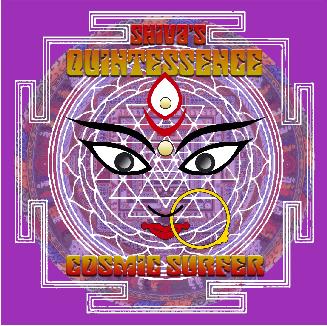 SHIVA on the SHIVA’S QUINTESSENCE CD (2005)
SHIVA on the SHIVA’S QUINTESSENCE CD (2005)
CD 1
Disc One is an observation of the on-going story of the human folly and the incessant need for greed to the point where unless we migrate to the moon or another planet, Earth will be un-inhabitable.
Reptilian Corporate Sign Language
This has a nice authentic R&B riff with a spacey vocal harmony over the top, leading into a tongue-in-cheek theatrical observation on how we have become enslaved to the corporate powers that control our society. It builds to a nice climax and vamps out on a guitar improvisation. and vocal scat over the Reptilian Corporate chant.
Ronnie Levine's guitar jams out in a big way on this track. He is the master of one take in the studio.
But What Am I?
Confronting the poor working class and beer drinking Aussie in the song is the reality that he has been abducted by aliens. He experiences a myriad of psychological emotions until he finally accepts his fate and begins to explore his true identity - asking at the end, "But what am I?" ,and then given the disappointing answer that he is simply "A very dirty fellow!" Notice the retro riff from "The Lion Sleeps Tonight" over the whima-whacka sounding riff "But what am I?"
We are joined by a great solo artist Jenny Bird... she is a successful song writer, guitarist, singer and powerful performer and has a strong fan base. She has toured with many top acts including The Indigo Girls. Her vocals on this track are a perfect blend with mine, and in keeping with the nature of the track she improvised it in one take... she did the same wonderful job on Giants!
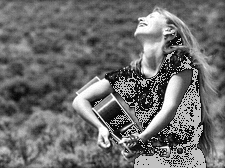 JENNY BIRD
JENNY BIRD
Dolphin Dreaming
Rudra presented me with a musical track that had a water feel to it. I thought to myself, water... ah ha! Dolphins. The only problem was that Dolphins have such a New Age image, and this is not a New Age ambient album. So I decided to put a melody and lyrics over the top that paralleled the current human life experience with that of Dolphins, revealing their ultimate secret - that they are the keepers of the Holy Grail.
Blue is Beautiful
The song starts with an alien who speaks like a Southern Baptist Minister and he is calling planet earth. It moves into a Brazilian calypso feel where we humans are asking for help and finally come up with the answer that perhaps forgiveness is the way to save this planet.
It vamps out on a chant "Blue is Beautiful" with me improvising different characters.
Didgeridoo Medicine Man
This has a straight-ahead rock riff feel, that takes you straight to the “cora” of my didgeridoo lifestyle. As with most of my songs there is a sense of satire, the only difference is that I am satirising myself. It appropriately leads into a Shiva chant which came to me as I was driving down the highway in my motor home. Ross Roberts tears this track apart with his Southern Style rock and roll guitar playing... he's on fire!
Everything is Weird
For years my wife and I would suddenly look at the other and exclaim, "Isn't everything weird?!" That 'observation' became the inspiration to this rap song. Just look around at the growing pollution, the senseless wars, the incessant violence, the epidemic Yuppy mentality, the Neo-Cons, etc, and convince me that everything is NOT weird!
Blame
This track really features the Maestro Ronnie Levine on guitar... this is his track... solo's and fills are executed with precision and fire, and all done in one take!!
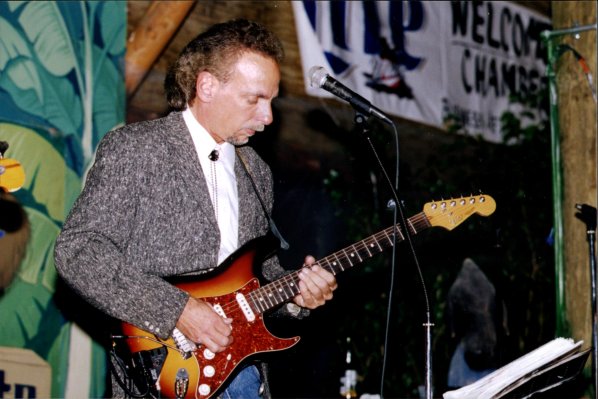 RONNIE LEVINE
RONNIE LEVINE
CD2
Giants
This was one of the first songs the original Quintessence recorded, and a fine example of a group composition. Rudra and I felt it needed something more to bring it up to date, so he sent me some chords and I began to hear a melody over them. MahaDev's guitar is excellent on this track... he covers all the guitar work, lead and rhythm, and his solo is the most haunting and melodic on the album"
A theme relating to the original lyrics was needed, so I thought that the Sumerian/Annunaki connection mentioned by Sitchin in his book "Genesis Revisited" related very strongly to the old song. The basic premise in his book is that the Annunaki genetically altered humans to a point of higher intelligence - after having enslaved our genetic ancestors to mine for gold, which supposedly extended the life span dramatically.
Cosmic Surfer
This track has a new feel but we think it still captures the energy of the original. I wrote this track for the original Quintessence with a different feel. I managed to put the full harmonies, as I had in the original, on the track with no problem. It's a remake that worked well with a different feel.
Ganga Mai
I think this is a great new version of the original. People say that of all the remakes we have done, this one really catches the original vibe of the first band, but with a modern feel on it.
Oasis
This one I wrote over ten years ago for my wife Jennifer. It speaks for itself. Ronnie Levine plays the lead solo with expert precision and attack... once again he did it in one take.
Sun
This track was originally written for Q, but I ended up doing a version of it for Kala, on the band’s only (self titled) album.
Hail Mary/Divine Mother chant
The Hail Mary I wrote for Quintessence and was performed once at the Royal Albert Hall.
Years later I ran it by Rudra and he loved it. So my wife and I rewrote the lyrics and then merged it into a chant that Rudra had come up with. After some more work remoulding the whole piece together, we created one of the best joint compositions on disc 2.
Hallelujad
I wrote this song, again, for Quintessence and recorded it on the Dive Deep album. I think that this remake is close to perfect.
Sri Ram Chant
I took some of the beautiful melodies of Swami Ji and added some new things to it and then recorded it a Quintessence album. We did a new version keeping to the original in honor of Swami Ji's memory. Ned Balen has returned to play tablas and percussion on this track. Ned used to sit in with the original Q and recorded on some albums, nice to have him back on board.
Om Mane Padme Hum
This track was a lot of fun to do. We improvised it most of the way, coming up with the idea that the listener is being guided by channeled entities who are guiding them through a spiritual journey.
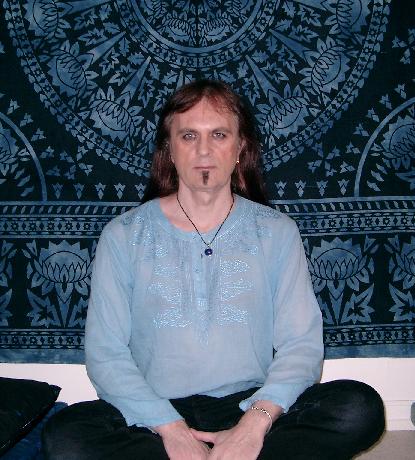
MUSICAL EVOLUTION
You clearly have a deep love and appreciation of Quintessence and other “underground” bands of the time. What is it about them that you find so appealing?
It was the mystical side, as I was well versed in mystical literature at the time and some bands reflected that interest. My mentor at the time fired my enthusiasm for English and I began to understand 'the message'.
These were the very last of the hippie days (early 70s), and even a band like Hawkwind were already considered a Hippie revival act. I grew to like the lyrics of UK rock writers like Peter Sinfield (King Crimson), Peter Hammill (Van der Graaf Generator), Bob Calvert (Hawkwind) and Roy Harper. They were all very 'literary', dense and full of wonder.
What the really great bands did was open a door to explore and experience the world differently. That's what kindled my own first music, mystical flights and sunny endeavours on church organ and synthesizers.
Your own music career stretches back and encompasses albums. Can you tell us a little bit about your music evolution?
In 1982 I helped compose and performed in an opera in 3 acts sponsored by the local government to honour 800 years of Winterthur. After going through some bands with no money I teamed up with talented young men from Zurich when the name Mooncowisms was given to us and we played experimental stuff. It was quite lively and we toured in Switzerland and France.
As all the members of Mooncowisms were busy musicians in different projects I began writing my own music. I built up my studio and released a few tapes of my songs and 2 years later this guy offered me a record contract.
One guy I saw play the violin like I've never heard before was Graham Clark, then a member of Gong offshoot band Gong-maison with Daevid Allen and Didier Malherbe. After a gig in Italy I asked him if he would like play on my upcoming album. He said yes.
So in 1989 the album “Time and Distance “ was released by B.O.Y. Records in Zurich, and we performed together at a festival, broadcast by Swiss Radio. The music, once again, was very avantgarde. But then exploring the developing new studio technology I slowly drifted into a one man band. In 1992 I did a show in London - UK Electronica. Will Strehler, a great local guy played guitars with me. This was heavy rock with electronics and sequencer... a bit weird.
The 1994 album Rite of Passage was still recorded on Otary 16 track and lacked a bit quality and is a little thin sounding. The label was Voiceprint before they became the company they are today, and I still think they owe me some money!
When electronic dance music was creeping up – such as Trance and Goa, a new outlet was formed with the Mooncow Project a duo with Percussionist Enzo Lopardo. We recorded an album called Nandi with trance and ambient tracks using a number of Quintessence samples. Enzo has remained close and appears on both Shiva Shakti and Shiva’s Quintessence.
When did you first get into synthesizers?
The first time I heard a Moog synth was on the radio in about 1970. Until I heard what certain people could do with it I was not too impressed. But listening to the early Krautrock Electronics, such as Klaus Schulze and later people like Francis Monkman, (Curved Air) Tim Blake (Gong) and Del Dettmar (Hawkwind) I started experimenting with audio oscillators drone-ing away and adding some vocal and piano atop.
I decided, around 1976 that I needed a Modular Synth. A custom built example was commissioned to be built, soon joined by a EMS Synthi A, which I use to this day.
I was never interested or much impressed with Keith Emerson or Rick Wakeman showing off at what speed they could play their synths. Synthesisers could create an ambience of positive healing! I definitely liked the mantric drone of a sustained and slowly filtered deep bass sound and I definitely liked the cosmic proportions of what you could do with a synth.
Between 1978-80 I played spaced out synth rock with long delays and pre-recorded Revox backings at festivals and in the studio. I also worked as a synthesizer courses teacher with a Yamaha music school. Many tapes must be around. So my background are the old analogue synths which I combine these days with all kinds of modern digital stuff, hard and software.
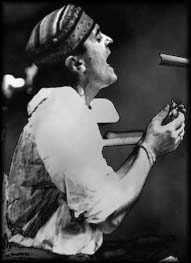
REAWAKENING THE Q SPIRIT
Shiva says you approached him to reawaken the spirit of Quintessence. Why did you decide to do this at the time you did?
All the sampling stuff with the Mooncow Project led me to include the odd Quintessence sample in the music. I thought, why not do a project with some of the original Quintessence musicians?
For some time I was not too sure about this idea until, one evening at a Mooncow Project gig I found myself intoning Shiva's words from the Quintessence song “Midnight Mode”. It was both a bewildering and blissful moment as it was completely improvised.
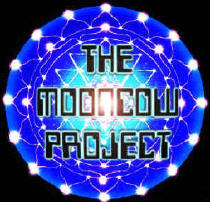
Shortly after the gig I called Shiva in New Mexico. I told him who I was and said: “Ecoutez Shiva, I have the Omkâra under my fingers. I sent him some samples of my work, he liked it, and he liked me. We went to the US to meet up and got on well. I got myself even a new name through initiation, so we formed Shiva Shakti. This was the best thing I ever did.
Contacting and jamming with Allan Mostert (original Quintessence lead guitarist) in Germany was cool musically but unfortunately he was not the person for our project. But Maha Dev (original Quintessence rhythm guitarist) was eager to contribute to some new music from the beginning. He invited us to his marriage up in Leeds in around 2002. No one else from the original band sent out any significant signs. So this is how the Quintessence spirit and music was revived.
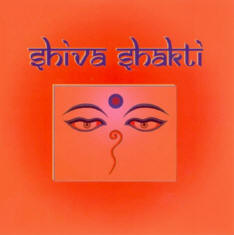 The whole project began with Shiva Shakti, right? What did you first send to Shiva to interest him?
The whole project began with Shiva Shakti, right? What did you first send to Shiva to interest him?
Yes, a new beginning was decided on with the birth of Shiva Shakti. The first material I sent him was the Nandi album, and a cd-r of other stuff. The first song for a Quintessence re-make I sent him was a version of “Cosmic Surfer”. We started chatting away on matters Quintessence and spiritual stuff, so an interest to work with each other grew quickly and has remained so. We are blessed to have so much friendship and play music together.
The collaboration is unusual because of its transcontinental edge. How does it work in practice? You send a click track and Shiva sings on top of it?
The one with the drone and the click track was the track Shiva Shakti where Shiva recites the words of Swami-ji and Ramakrishna and the whole track is like one long prayer. Normally I send him a fairly worked out arrangement of a song over which he records his stuff in a studio and I get his contributions back as computer files. Physical distance is nothing, well maybe a little expensive, but we know exactly what we can do and modern technology helps. We also talk at length on the phone. I make the final arrangements in my studio to reach the point where we both like the respective song the best. We only meet up for personal pleasure or in time of crisis!
What are the bits about both albums that you are most pleased with?
From Shiva Shakti I like the title track, “Notting Hill Gate”, “High on Mt Kailash”, and “Sea of Immmortality” a lot, depending on the mood. Also I'm fond of “Brahman” which is mysterious and mind-blowing at the end. The new SQ album “Cosmic Surfer” is a clear improvement on all levels and I don't have any specific tracks I particularly prefer - they are all corkers!
Which Quintessence re-workings are the ones that you think really add to the originals?
All the Quintessence re-workings are like new songs. So, they are re-interpretations rather than note for note imitations. We always try to bring in new musical sections to the old songs. Considering the jamming qualities of the old band, most songs turned into jams, but we have little of this chaotic nature in our music in general.
The first song we added a new section to was “Notting Hill Gate” with a much punchier rhythm track and spacey synths, and a rocking Maha Dev strumming, together with freaky vocals at the end. We found this approach fun, but I think we capture that transcendental feel of the more devotional aspects of the songs. It's still in the voice you hear!
We would also play old favourite “Cosmic Surfer” in half-beat or give “Brahman” completely new instrumentation and outer-space ambience. What you can actually hear is the strange breathing of the Solar wind near the planet Saturn.
Following this approach we did “The Seer”, “Sea of Immortality”, “Hallelujad”, “Giants” and a version of “Ganga Mai” that even to us is a surprise and a trip! We have recorded two more songs for future release, namely “Only Love” and “Jesus, Buddha, Moses, Gauranga”.
What I feel we really aim to do is keep the flame of Swami-ji's words and music alive, carrying them into this world of Samsara and Kali Yuga, to help give a little healing.
Have you considered ambient albums as well in the Q spirit?
No. But when you hear closely you'll find most songs 'contain' some form of ambience with sounds from Nature, or Animal noises, oriental market street noise, water sounds, voice samples etc. Therefore I would say most of our music is 'ambient'! An ambient album in the Quintessence spirit is not possible these days, because of the audience today. The message would be lost.
Do you share the same Guru as Shiva?
From early childhood on I have been familiar with the female energy that is Consciousness. Ramakrishna, Sirdi Sai Baba, Vivekananda, Shivananda, Yogananda - all these Masters are prophets and Gurus of the One God. Ultimately there's only one Guru - therefore Swami Ambikananda is also my Guru. In his holy name I was given my spiritual name, Rudra, and am grateful and blessed.